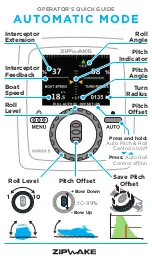
13
Fig. I
Fig. K
Fig. H
• The welding area must be dry and free of contamination. Dirt particles may compromise the test.
• The welding area to be tested is to be lubricated or sprayed with a liquid which forms bubbles (such as soapsuds)
directly before the test. (This is to ensure that the liquid has no unacceptable effects on the seam and the welding
material).
• Position the
VACUUM BOX (2)
/ VACUUM BELL (2)
at the point to be tested.
• Place the
VACUUM BOX (2)
/ VACUUM BELL (2)
and then push down on it so that the seam to be tested lies
at the approximate center of the longitudinal axis of the
VACUUM BOX (2)
/ VACUUM BELL (2)
(Fig. H)
. For
extended test sections, the
VACUUM BOX (2)
/ VACUUM BELL (2)
needs to be repositioned accordingly. When
moving the
VACUUM BOX (2) / VACUUM BELL (2),
make sure it/they overlap(s) the testing areas.
• To enable a negative pressure to be generated, the
VACUUM BOX (2)
/ VACUUM BELL (2)
must be pressed down
onto the testing area using both
handles (4)
.
(Fig. I)
• Check the weld seam for leaks.
• The seam is regarded as being tight when negative pressure builds up quickly, remains constant for the duration
of the test, and does not cause bubbles to form in the seam.
• Use the
regulating relief valve (8)
to relieve the negative pressure.
(Fig. K)
• Mark and repair any areas that are not tight.
The negative pressure is displayed on the
manometer (6)
.
The negative pressure should
never exceed 0.5 bar; disregarding this may cause an implosion.
Preparing and commissioning the VACUUM BOX / VACUUM BELL with VACUUM PUMP
Testing using a VACUUM BOX / VACUUM BELL with VACUUM PUMP
Fig. G
• Set the required negative pressure using the
regulating relief valve (8)
:
– Place the
VACUUM BOX (2) / VACUUM BELL (2)
on the membrane to be tested and then push it/them down.
– During the testing phase, the negative pressure (max. 0.5 bar) can be set using the
adjusting nut (10)
on the
regu-
lating relief valve (8)
. To do this, the
adjusting nut (10)
must be screwed downward in a clockwise direction.
(Fig. F)
– When the required value is set, the
adjusting nut (10)
of the
regulating relief valve (8)
needs to be locked
using the
lock nut (11)
(A/F 10). When in operation, the
adjusting nut (10)
must always be secured by the
lock nut (11)
.
(Fig. G)
– Use the
regulating relief valve (8) (Fig. K)
to relieve the negative pressure.
Fig. F
11
10
Содержание VACUUM BELL
Страница 57: ...57 VTE3 CN...
Страница 59: ...59 1 6 8 3 2 7 5 4 1 7 2 8 6 3 4 5 1 2 1 2 3 4 3 4 5 6 5 6 7 8 7 8...
Страница 60: ...60 2 2 7 1 2 2 5 1 2 2 A D E B 1 3 1 A 7 2 2 2 2 8 11 8 B 8 10 0 2 bar 10 11 C 2 2 E 1 D 1 8 C 11 10...
Страница 61: ...61 I K H 2 2 2 2 2 2 H 2 2 2 2 2 2 4 I 8 K 6 0 5 bar G 2 2 8 10 0 5 bar 10 F 8 10 11 10 10 11 G 8 K F 11 10...
Страница 62: ...62 7 1 2 2 3 3 www leister com Picolino VTE 3...
Страница 63: ...63...














































